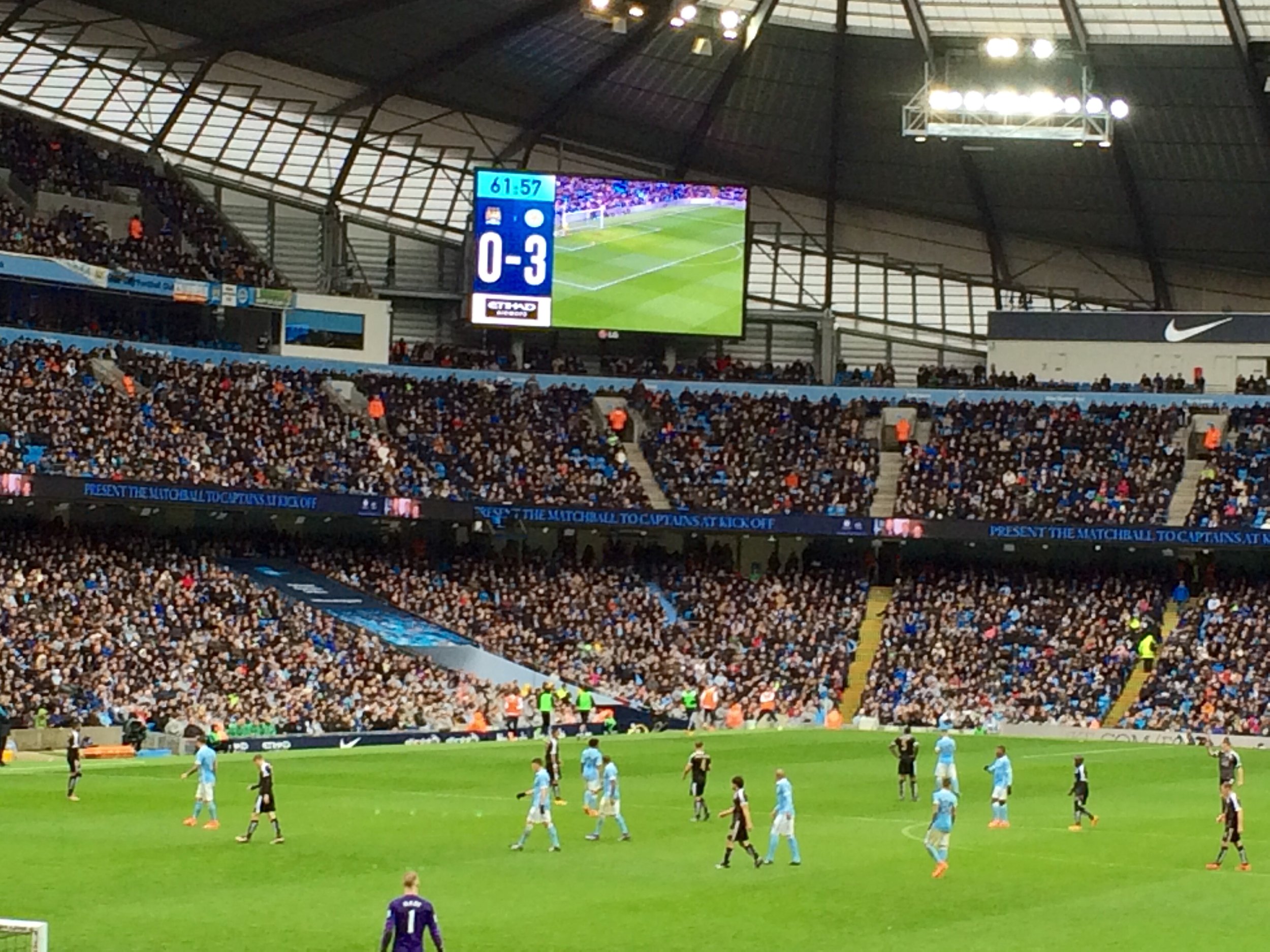Manchester City 3 Leicester City 1: Fifteen minutes of magic
The Dean Smith era began in classic Leicester City fashion, with an opposition centre back smashing in the opener on his weaker foot. After ten minutes, we were staring down the double figures barrel. So why does it all feel so good?
Every now and again, football has the ability to thrust you into the middle of an entirely novel experience. Over the years, Leicester have launched improbable comebacks, blown impregnable leads, and lost seemingly every game for months on end. Yet rarely have we ever lost like this.
For a long time, this was the most one-sided game of the season. Perhaps, one of the most one-sided Premier League games ever. Manchester City could have scored as many as they wanted. Instead, they put their out of office on after half an hour and went to the pub.
After that, the main attraction was listening to the sound of Martin Tyler commentating with a thousand yard stare, forced to confront his own mortality as the sands of time ebbed away. The game was over. Done. Finito.
Until it wasn’t.
All’s well that ended well
The peak-end rule describes a process where the human experience of an event is dictated by how it felt at its peak and at the end. Behavioural psychologists have spent years researching this phenomenon, conjuring up experiments and writing up scientific papers to hone our understanding of it.
How unfortunate that instead of dedicating their life’s work to that noble goal, they could have just watched this game instead. For 75 minutes, it was tortuous, an exercise in utter futility. By the final whistle, we were in dreamland, celebrating an xG victory and bemoaning a plethora of missed chances in the dying stages.
Perhaps all those psychologists could dedicate their newly-discovered free time to explaining whether we can take anything from those glorious last 15 minutes. On the one hand, Manchester City had replaced their entire first team by then. On the other, Leicester’s dramatic improvement coincided with our bringing on all the players who should have been in the team anyway.
The old guard’s last stand
A lot of Dean Smith’s comments in his first week of taking the job have sounded promising. He’s talked about getting the ball forward quicker, outlined that his most important task is restoring confidence, and questioned why James Maddison is having to come deep to get the ball.
For a fanbase that has spent a year listening to the manager gaslight them into believing that the plan is working perfectly, this has been a refreshing change. But what this team really needs is a fresh voice, and with Craig Shakespeare on the staff, this new coaching team is not really that. The fear is that loyalty to former friends will encourage Smith to keep picking the same old faces.
The first team sheet of the new era did nothing to allay those fears. The first half only exacerbated them. Jamie Vardy has started all three games since Brendan Rodgers was sacked, the best case explanation for this astonishing act of blindness is that the coaching staff think Rodgers’ tactics were to blame for his decline. The worst case is that he plays because he’s mates with coaches who aren’t strong enough to leave him out.
It’s the same story with Wilfred Ndidi. He too has started every game since Rodgers left. So far his contribution over that period is an assist for the Villa winner, literally handing Manchester City a goal, and a half-hearted tackle in midfield that led to another one.
The party line is that these players offer ‘leadership’ and ‘physicality’. Yet it all becomes a bit irrelevant if they also keep costing you points. It’s all the more frustrating because there are alternatives who, while they may not have the size or the ability to point at open space quite so effectively, contribute far more when they play.
The greatest comeback that never was
That, then, was what we would have been talking about had the game ended at half time. Or after an hour, by which point Tyler had resorted to regaling interesting tidbits from Papy Mendy’s career while Manchester City treated us to the sort of turgid passing display that would make the late Brendan blush.
Yet this might be Sheikh Mansour and the Oil Boys’ fatal flaw. Just like at the King Power in October, the game became so easy for them that they fell asleep. Smith had canned Vardy at half time, Kelechi Iheanacho was lurking up front. Praet had replaced Dewsbury-Hall, Mendy on in place of the unfit Tielemans. And the chances started coming.
One of the narratives on Sky as they were desperately filling time was how Leicester’s failure to replace Vardy is a contributing factor in the decline. That isn’t really true. Iheanacho may not be a perfect striker, and he isn’t the same type of player as Vardy, but he has many of the traits that peak-Vardy had. He can be anonymous, he can look awful, but things happen when he’s around.
First, a corner(!) broke to him a yard out to reduce the deficit. He scores those sort of goals. Then he showed a lovely bit of skill to send Ruben Dias into the stands and fired over. He’s that type of striker, too. Had he played Maddison in instead, it would surely have been 3-2.
Dias was still dizzy a few minutes later, when he played Maddison in on the goalkeeper. Unfortunately, Leicester’s number 10 failed to square for an Iheanacho tap-in. When he did pick out the Nigerian with a brilliant pass in behind (he’s that type of striker, too) in the dying stages, Iheanacho hit the inside of the post.
If we add in Praet’s tame shot at the keeper earlier on, Leicester created five excellent chances in the last 20 minutes, more than enough to salvage an extraordinary comeback. It wasn’t to be, but it was a sign of life beyond anything we’ve seen for weeks.
Full speed ahead
Maybe this will end up being a strange, quirky game, meaningless in the grand arc of an embarrassing relegation. Or maybe this crash course in Leicester City 2023 is exactly what Smith needed in the first game.
He’s seen all the classics already: the sudden, secret injury to a key player before the game, club captain Jonny Evans wanting no part of being involved in a real football match, conceding inside five minutes to someone’s first Premier League goal in 18 months, the defence committing hari-kiri to give away two more goals.
But he also acted quickly to replace Vardy, and he’d already recalled Caglar Soyuncu from exile to start at the Etihad. In the second half, he saw a glimmer of the good stuff. Iheanacho’s vast superiority to any other striker, how much better Leicester keep the ball with Mendy on the pitch, how threatening we can be when we get the ball forward.
It’s hard to judge Smith’s ideas or ability based on this one game. It’s fair to ask some questions about a starting team featuring approximately zero pace when the plan seemed to be to sit deep from the off. But it was Manchester City away, hardly the place for a manager to unveil his most brilliant attacking formation.
The real quiz starts next week in front of a jazzed up King Power. If the new management team have absorbed the obvious takeaways from this game and learned the lessons from them, there’s still time to turn this ship around.
Viewpoint
Via @OwynnPA





